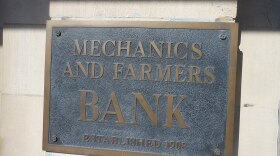Many African Americans searching for their family histories hit a wall when they get to the 1860s or 1870s. During slavery, the only public records for enslaved people were deeds, which classified them as property and said nothing of their lived experiences, or even marked their birth or death.
UNC-Greensboro’s project “People, Not Property: Slave Deeds of North Carolina” aims to digitize all public records of enslaved people across the state of North Carolina to provide individuals and communities more access to information about who was enslaved in our state and how that history informs community institutions today. The project is a collaboration among several institutions, including North Carolina Central University and North Carolina A&T State University, and is currently focusing on the records of 26 counties. Students from some of these schools had the opportunity to travel to eastern North Carolina this summer to dig up slave deeds in local courthouses and talk to communities about how these records impact the public.
Host Frank Stasio talks to Arwin Smallwood, professor and chair of the department of history and political science at North Carolina A&T, about this project and a new video series that puts the documents into a historical context. North Carolina A&T third-year history students Deshawn Elam and Joanna Martinez also join the conversation to share their stories from the research process.













